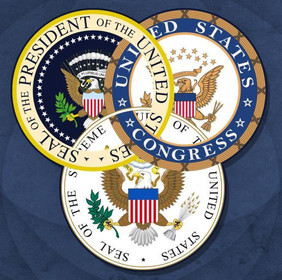the entire point of segregating the powers of a monarch into the three different branches of government was to give each branch certain authority that the others did not possess. Thus, while the branches might well be conceived of as co-equals (in the sense that one cannot unlawfully subvert the prerogatives of another), that does not mean that all three branches must be deemed to have the same powers. To the contrary, the President cannot hale members of Congress into the White House for questioning precisely because the power of inquiry resides with the Legislature, and also because the Constitution itself expressly prevents the Executive branch from becoming inquisitors by inflicting its own subpoena power on members of Congress for political reasons.
Therefore, DOJ’s argument that the House of Representatives, which unquestionably possesses the constitutionally authorized power of inquiry and also the power of impeachment, should not be able to issue subpoenas to executive branch officials because the President cannot do the same to them, simultaneously appreciates traditional separation-of-powers principles and subverts them, and as such, truly makes no sense.

